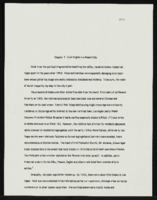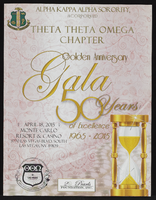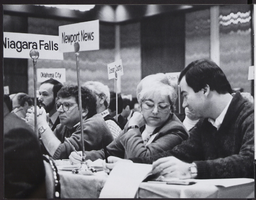Search the Special Collections and Archives Portal
Search Results

William O'Neill McCurdy Sr. oral history interview: transcript
Date
Archival Collection
Description
Oral history interview with William O'Neill McCurdy by Claytee D. White on January 26, 2022 for the African Americans in Las Vegas: A Collaborative Oral History Project. In this interview, McCurdy describes his childhood growing up in Las Vegas, Nevada, graduating from Valley High School, and attending Western Nevada College in Carson City, Nevada. He worked for many years for the Parks and Recreation department, and has served on numerous boards including the Citizens' Advisory for Regional Transportation (RTC), Habitat for Humanity Board of Director, Mineral County Economic Advisory Committee, City of Las Vegas Community Block Grant Advisory Board, and Southern Nevada Regional Housing Authority Commission. Currently, McCurdy owns McCurdy & McCurdy Media Group, a political consulting and advertising firm which has assisted numerous political candidates in fulfilling their dreams of helping to govern Las Vegas, Clark County, the State of Nevada, and even in the United States Congress.
Text

Kelly Benavidez oral history interview: transcript
Date
Archival Collection
Description
Oral history interview with Kelly Benavidez conducted by Maribel Estrada Calderón on January 29, 2019 for the Latinx Voices of Southern Nevada Oral History Project. Laurents Bañuelos-Benitez also participates in the questioning. Kelly Benavidez is originally from San Francisco, California. Benavidez arrived in Las Vegas after her family spent two years in Mexico so her and her brother could learn Spanish. Benavidez and her family have remained in Las Vegas ever since. Kelly attended Area Technical Trade School for hotel management, and was then recruited by Mesa State College in Colorado. She currently works for Commissioner Lawrence Weekly. Her list of community involvement is extensive: Las Vegas-Clark County Library District Board, the Fernando Vargas Foundation, Las Vegas Latin Chamber of Commerce, Hispanics in Politics, Latina Network, among others. Subjects discussed include: Las Vegas, Commissioner Weekly, New York New York construction accident, and Spanish Language.
Text

Kathia Quiros Pereira oral history interview: transcript
Date
Archival Collection
Description
Oral history interview with Kathia Quiros Pereira conducted by Monserrath Hernández on March 6, 2020 for the Latinx Voices of Southern Nevada Oral History Project. Pereira discusses her personal history and immigration from Lima, Peru to the United States. She also talks of her educational background as a student at the William S. Boyd School of Law at the University of Nevada, Las Vegas and her current work as a founding partner of Pereira Immigration Law Group where she exclusively practices immigration law in Las Vegas.
Text

"Chapter 7: Civil Rights in a Resort City": manuscript by Roosevelt Fitzgerald
Date
Archival Collection
Description
From the Roosevelt Fitzgerald Professional Papers (MS-01082) -- Unpublished manuscripts file. Pages 274 -313 of unknown manuscript.
Text

Herman Jimerson, Ruth Jimerson-Carter, and Leon Carter Jr. oral history interview: transcript
Date
Archival Collection
Description
Herman Jimerson and his younger sister Ruth Jimerson-Carter, along with her husband Leon Carter Jr., gathered on March 3, 2021, to talk about their memories and experiences growing up in West Las Vegas—the Westside.
OH-03746 contains additional interviews with the Carter family that are not transcribed in this document. Contact special.collections@unlv.edu for more information.
Text

Jessica Anderson oral history interview: transcript
Date
Archival Collection
Description
Oral history interview with Jessica Anderson conducted by Claytee D. White on March 7, 2019 for the Remembering 1 October Oral History Project. Anderson begins talking about her early life, family, work history, and the reason why she had moved to Las Vegas, Nevada in 1991. She goes on to talk about the history of Outdoors Nevada where she currently works, and what she was doing the day of October 1, 2017. Anderson recalls how she found out about the shooting, reaching out to friends, and learning more about what happened that night. Anderson talks about the aftermath of the event, how it affected everyone involved, and the healing aspect afterwards. Lastly, she describes the process of creating the Healing Garden, the features of the garden, and the future plans for the area.
Text

Theta Theta Omega, 50th Golden Anniversary Gala (Monte Carlo Hotel)
Date
Archival Collection
Description
From the Alpha Kappa Alpha Sorority, Incorporated, Theta Theta Omega Chapter Records (MS-01014) -- Ivy Leaf magazines and event souvenir programs file.
Text



